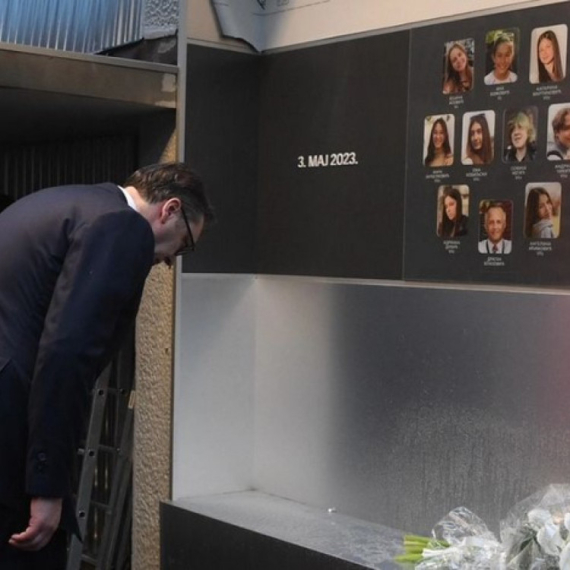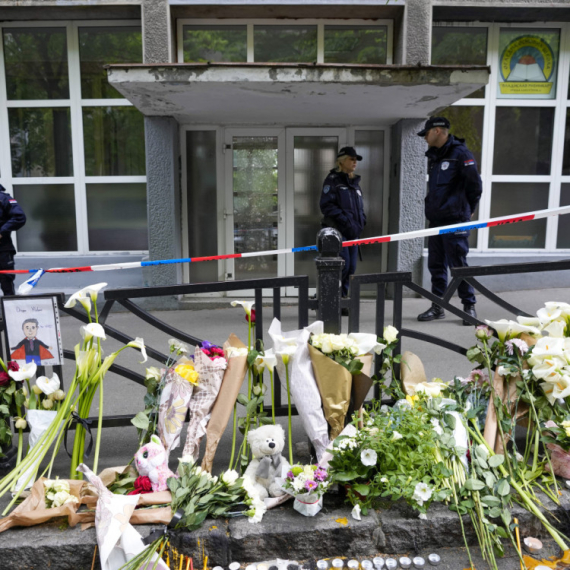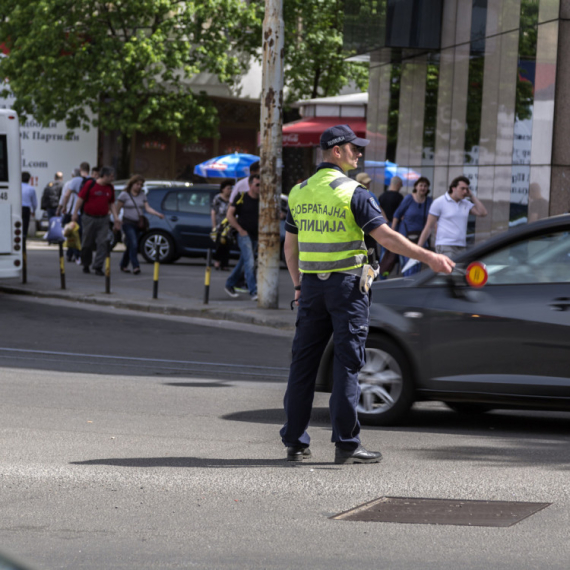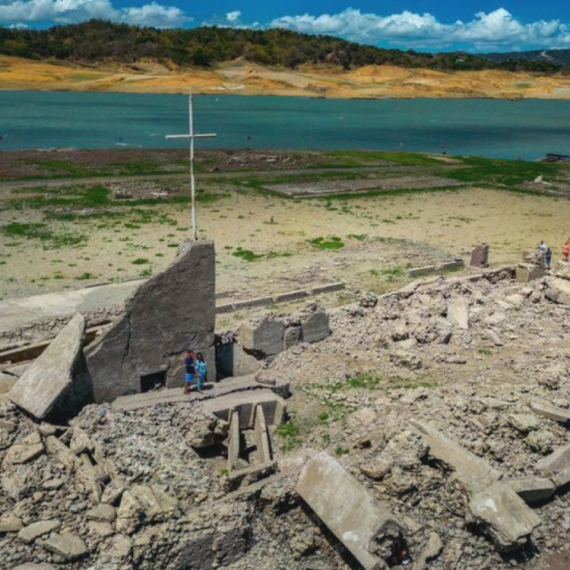Top officials define strategy for continuation of talks
The most influential representatives of the international community should encourage Priština to make concessions, says presidential advisor Marko Đurić.
Friday, 01.03.2013.
09:28

BELGRADE The most influential representatives of the international community should encourage Pristina to make concessions, says presidential advisor Marko Djuric. “Pristina needs to make certain concessions in order for an agreement to be reached at a crucial moment in the dialogue held in Brussels,” he said after a meeting of senior state officials who discussed the continuation of the dialogue on Friday. Top officials define strategy for continuation of talks Djuric told reporters that the top officials had reiterated that Serbia was ready to fulfill all obligations from the European Commission's conclusions in order to get a date for the beginning of the EU accession negotiations. He explained that Serbia would not give up on the dialogue but that it requested the forming of a community of Serb municipalities, adding that Serbia believed that Pristina needed to make “tough concessions” in order to reach a permanent and sustainable solution. "Now is the key moment for the international community to encourage Pristina to be readier for compromise and concessions. Our commitment to a compromise will not be brought into question, but we cannot expect that our side will agree to be the only one to make concessions," Djuric told reporters after the meeting. He said in this context that Serbia was urging all parties, which had influence in the international community, to convey this message to the Pristina institutions since this was a moment when Pristina needed to show readiness for a compromise that is in the interest of both parties. “Great responsibility is on representatives of the international community, and we expect them to do that,” Djuric noted. “Moreover, it is not in Pristina's interest to be a hostage to a policy which is not ready for a dialogue,” he said. Djuric stressed that Serbia would go to Monday talks with a defined strategy and a sincere desire for an agreement and compromise to be reached and it was ready to negotiate constructively on all elements of regulation of the relations in the province based in the principles adopted in the Resolution on Kosovo. As he put it, Serbia has a clear concept about forming a community of Serb municipalities which would have jurisdictions in many spheres of life, such as justice system, police and education, and is ready for serious talks. "We believe it is possible for the representatives of the international community to now send a message to Pristina that it should be ready to make concessions in order for compromise to be reached. This is the crucial crossroads in the talks," the president’s advisor stressed. When asked whether the talks could fail, he said that there was no danger that Serbia would give up on the effort to reach a compromise on the establishment of the community of Serb municipalities and greatest guarantees for political and other rights not only of Serbs, but also of other communities. He also said that Friday's meeting discussed the EU integration, adding that by April 16 (when the European Commission will publish its report on Serbia's progress on the EU path) there would be no formal or factual reasons for not giving the country a date for the start of EU accession talks. “Serbia is ready to fulfill all requests from the conclusions of the EU Council,” Djuric said. The meeting at President Tomislav Nikolic's office was attended by Serbian Prime Minister Ivica Dacic, First Deputy Prime Minister Aleksandar Vucic, Djuric, Office for Kosovo Director Aleksandar Vulin and Finance and Economy Minister Mladjan Dinkic. The meeting that started around 9:00 CET lasted for about an hour and a half. Marko Djuric addresses reporters on Friday in Belgrade (Tanjug) It takes two to have dialogue, PM says Dacic said earlier that he he did not know which direction the talks with Pristina could even go because its representatives did not even wish to discuss giving an association of Serb municipalities executive powers. He said that Belgrade wanted to make progress in the dialogue, not because of the EU and the accession talks date but because it was necessary to implement reforms. “On the other hand, if someone is counting that we will relent and accept something that is not in our state and national interest for the sake of the date, then I think it is also a wrong approach,” the PM stressed. He noted that Serbia had been fair in the negotiations and that it remained committed to the dialogue as the only solution but added that “it takes two, in this case three, to have a dialogue”. “I do not know what else we can propose aside from recognizing Kosovo’s independence and saying ‘nothing we say is respected, do whatever you want’,” he pointed out. Dacic reiterated that he believed that the partition of Kosovo and separation was the best solution. The next round of the dialogue is scheduled for March 4 in Brussels. Center for Regionalism Director Aleksandar Popov told B92 that this was a crucial round of the negotiations and that everything “will be much easier afterward”. According to him, Dacic is sending a message to EU High Representative Catherine Ashton to exert pressure on Kosovo PM Hashim Thaci to accept higher level of authority for Serb municipalities in Kosovo with his statements on partition. “However, Thaci is under pressure of the domestic public so there is a chance that this round of the negotiations will be a debacle which will affect a date for the beginning of the EU accession negotiations,” Popov explained. B92 Beta Tanjug
Top officials define strategy for continuation of talks
Đurić told reporters that the top officials had reiterated that Serbia was ready to fulfill all obligations from the European Commission's conclusions in order to get a date for the beginning of the EU accession negotiations.He explained that Serbia would not give up on the dialogue but that it requested the forming of a community of Serb municipalities, adding that Serbia believed that Priština needed to make “tough concessions” in order to reach a permanent and sustainable solution.
"Now is the key moment for the international community to encourage Priština to be readier for compromise and concessions. Our commitment to a compromise will not be brought into question, but we cannot expect that our side will agree to be the only one to make concessions," Đurić told reporters after the meeting.
He said in this context that Serbia was urging all parties, which had influence in the international community, to convey this message to the Priština institutions since this was a moment when Priština needed to show readiness for a compromise that is in the interest of both parties.
“Great responsibility is on representatives of the international community, and we expect them to do that,” Đurić noted.
“Moreover, it is not in Priština's interest to be a hostage to a policy which is not ready for a dialogue,” he said.
Đurić stressed that Serbia would go to Monday talks with a defined strategy and a sincere desire for an agreement and compromise to be reached and it was ready to negotiate constructively on all elements of regulation of the relations in the province based in the principles adopted in the Resolution on Kosovo.
As he put it, Serbia has a clear concept about forming a community of Serb municipalities which would have jurisdictions in many spheres of life, such as justice system, police and education, and is ready for serious talks.
"We believe it is possible for the representatives of the international community to now send a message to Priština that it should be ready to make concessions in order for compromise to be reached. This is the crucial crossroads in the talks," the president’s advisor stressed.
When asked whether the talks could fail, he said that there was no danger that Serbia would give up on the effort to reach a compromise on the establishment of the community of Serb municipalities and greatest guarantees for political and other rights not only of Serbs, but also of other communities.
He also said that Friday's meeting discussed the EU integration, adding that by April 16 (when the European Commission will publish its report on Serbia's progress on the EU path) there would be no formal or factual reasons for not giving the country a date for the start of EU accession talks.
“Serbia is ready to fulfill all requests from the conclusions of the EU Council,” Đurić said.
The meeting at President Tomislav Nikolić's office was attended by Serbian Prime Minister Ivica Dačić, First Deputy Prime Minister Aleksandar Vučić, Đurić, Office for Kosovo Director Aleksandar Vulin and Finance and Economy Minister Mlađan Dinkić.
The meeting that started around 9:00 CET lasted for about an hour and a half.
It takes two to have dialogue, PM says
Dačić said earlier that he he did not know which direction the talks with Priština could even go because its representatives did not even wish to discuss giving an association of Serb municipalities executive powers.He said that Belgrade wanted to make progress in the dialogue, not because of the EU and the accession talks date but because it was necessary to implement reforms.
“On the other hand, if someone is counting that we will relent and accept something that is not in our state and national interest for the sake of the date, then I think it is also a wrong approach,” the PM stressed.
He noted that Serbia had been fair in the negotiations and that it remained committed to the dialogue as the only solution but added that “it takes two, in this case three, to have a dialogue”.
“I do not know what else we can propose aside from recognizing Kosovo’s independence and saying ‘nothing we say is respected, do whatever you want’,” he pointed out.
Dačić reiterated that he believed that the partition of Kosovo and separation was the best solution.
The next round of the dialogue is scheduled for March 4 in Brussels.
Center for Regionalism Director Aleksandar Popov told B92 that this was a crucial round of the negotiations and that everything “will be much easier afterward”.
According to him, Dačić is sending a message to EU High Representative Catherine Ashton to exert pressure on Kosovo PM Hashim Thaci to accept higher level of authority for Serb municipalities in Kosovo with his statements on partition.
“However, Thaci is under pressure of the domestic public so there is a chance that this round of the negotiations will be a debacle which will affect a date for the beginning of the EU accession negotiations,” Popov explained.
























































Komentari 28
Pogledaj komentare